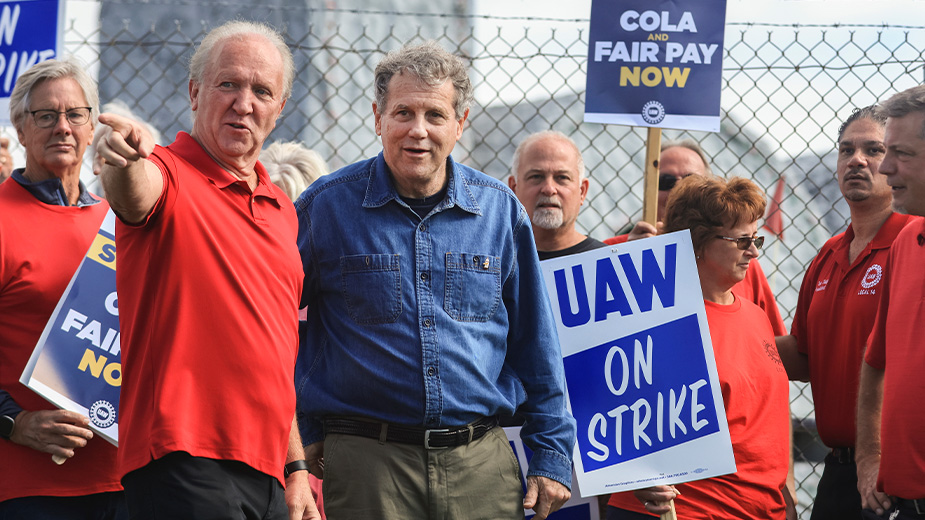UAW Settles Into First Day of Strike Against Big 3
YOUNGSTOWN, Ohio – A fair contract for autoworkers benefits the communities where they live and helps lift the economies of the region, a United Auto Workers district officer said Friday as 13,000 UAW members settled into the first day of a strike against the Big Three automakers.
“When we raise the standard for working folks across the board, that’s good for our economies and our local communities,” said Dave Green, director of UAW Region 2B, based in Maumee, Ohio, near Toledo.
Yet others say a prolonged strike could cost the nation’s economy billions of dollars over the next two weeks and would have a major impact on the state’s economy.
“A sustained strike by the UAW will have major implications for Ohio’s economy,” Ryan Augsburger, president of the Ohio Manufacturers’ Association, said in a statement Friday. “The Buckeye State produces more auto parts than any other state and is No. 2 in the U.S. for assembly of automobiles.”
Green said he spent the morning on the picket line in front of a Stellantis plant in Toledo, where workers walked off the job at midnight after negotiations between the UAW and the Big Three automakers failed to yield a new bargaining agreement.
“The local there is big and organized and was ready to go,” Green said as he was on his way to Detroit to join a large downtown rally planned for 5 p.m. “Now, it’s just a waiting game.”
Green said there were no talks scheduled for today and doesn’t expect to see any additional movement for several days.
At midnight Friday, approximately 13,000 UAW members walked off the job in a targeted strike against three plants operated by General Motors, Ford Motor Co. and Stellantis. The UAW represents approximately 145,000 members nationwide.
Among the plants targeted for the “stand up” strike is a Stellantis assembly plant in Toledo. U.S. Sen. Sherrod Brown, D-Ohio, spent several hours with picketing workers outside the Stellantis plant Friday morning.
“Today Ohioans stand in solidarity with autoworkers around our state as they demand the Big 3 automakers respect the work they do to make these companies successful,” Brown said in a statement. “Any union family knows that a strike is always a last resort – autoworkers want to be on the job, not on the picket line. “
He emphasized that UAW workers made sacrifices to save the American auto industry during the economic collapse of 2008-2009 and in other periods where the industry struggled.
“Now the Big 3 are making record profits – all workers are asking for is their fair share,” Brown said. “The companies need to bargain in good faith and agree to a fair contract that honors the dignity of work.”
President Joe Biden on Friday urged the parties to resume negotiations, underscoring that “no one wants a strike. But I respect workers’ right to use their options under the collective bargaining system.”
However, an extended strike could have a major negative impact on the country and Ohio in particular, the Ohio Manufacturing Association’s Augsburger said.
“Nationwide, a strike against the Big Three auto manufacturers would mean an economic loss of $5.6 billion after just 10 days, according to the Anderson Economic Group,” Augsburger said. “Ohio would bear the brunt of this loss.”
He said the OMA is extremely concerned about the financial impact on auto suppliers and their employees who would be held “hostage” by a long-term strike.
“Inflammatory rhetoric and unreasonable demands must be replaced with rational, good-faith negotiations and an awareness that America’s auto sector faces stiff global competition,” he said.
“The OMA urges UAW leaders to return to the negotiating table with a serious resolve to end this standoff and prioritize the competitiveness of America’s auto sector – for the sake of our nation’s and state’s economies,” he said.
UAW President Shawn Fain announced Thursday evening just before the existing contract expired that UAW workers were prepared to strike at three plants owned by the three automakers – a first of its kind in the union’s 88-year history.
Aside from the Toledo plant, workers set up pickets at a Ford plant in Detroit and a GM plant in Missouri.
The UAW is proposing that the automakers instate a 36% pay raise over four years for UAW members, end a two-tier wage system and implement four-day work weeks, among other proposals.
On Thursday, automaker Ford responded with proposals of a 20% pay raise over four years, while GM and Stellantis countered with an 18% and 17.5% increase, respectively, over the period.
Fain has adopted a more aggressive tone for the UAW since he was elected president in March.
“Today, America’s autoworkers are in the fight of their lives,” Fain said during a Facebook Live broadcast Thursday night. “The world is watching, and the UAW is ready to stand up. This is our defining moment.”
Pictured at top: Bruce Baumhower, president of UAW Local 12, talks with U.S. Sen. Sherrod Brown on the picket line Friday at the Stellantis Toledo Assembly Complex in Toledo, Ohio. (Jeremy Wadsworth | The Blade via AP)
Copyright 2024 The Business Journal, Youngstown, Ohio.



